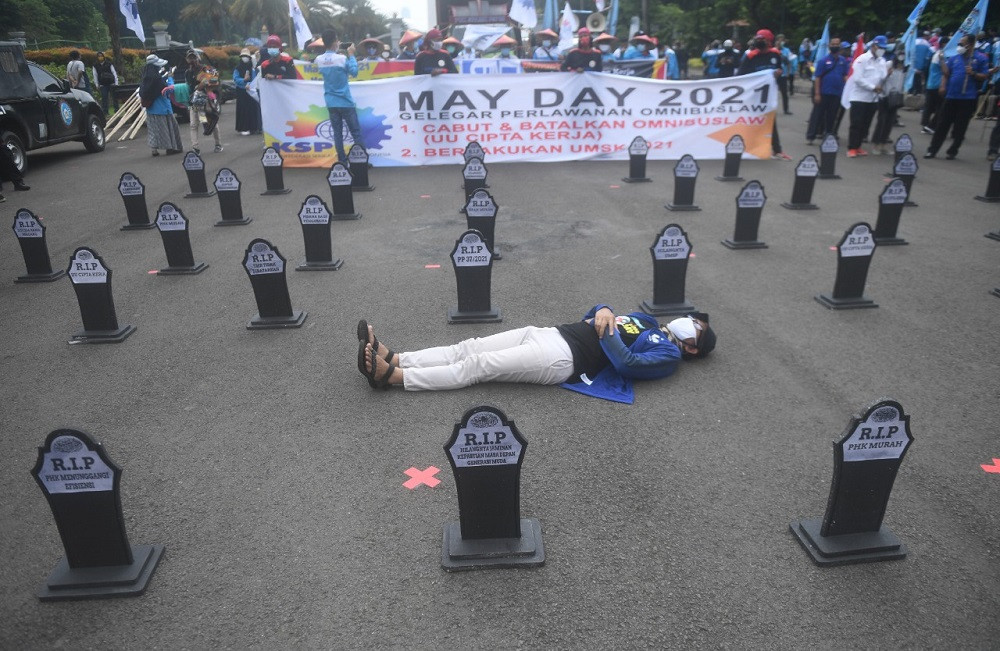Popular Reads
Top Results
Can't find what you're looking for?
View all search resultsPopular Reads
Top Results
Can't find what you're looking for?
View all search resultsPolitics of fear
While the Constitution recognizes the Perppu as a legal instrument, it still requires the president to invoke a “compelling emergency” to justify its use.
Change text size
Gift Premium Articles
to Anyone
P
resident Joko “Jokowi” Widodo has cited a possible economic recession this year to justify his executive order implementing the 2021 Job Creation Law, which has been declared conditionally unconstitutional by the Constitutional Court.
His economic ministers say the regulation in lieu of law (Perppu) on the Job Creation Law, issued just before the New Year, is necessary to create greater legal certainty and bolster investment to help Indonesia cope with the feared recession.
It will take a lot more than a presidential writ to convince foreign and domestic investors that Indonesia is a good place to invest. The investment climate is affected by many other factors, such as the political environment, governance, clean and effective bureaucracy and now public health too.
While the Constitution recognizes the Perppu as a legal instrument, it still requires the president to invoke a “compelling emergency” to justify its use. Critics don’t buy the government’s argument that the anticipated recession meets this criterion, much less that the move will bolster investment.
The Perppu must still be endorsed by the House of Representatives, but with the seven-party government coalition controlling more than 80 percent of the House, it looks like Jokowi will have his way.
The government says that in a democracy, any new regulation is bound to have its “pros and cons”. Looking at the public debate in the past week, the “pros” come mostly from the business world and the “cons” from labor and environmental groups.
The Constitutional Court in November 2021 ruled the Job Creation Law “conditionally unconstitutional”, noting that the legislation had bypassed “meaningful public consultation”. When the Perppu was announced, labor and environmental groups, and some business organizations, were taken by surprise and said they had not been consulted in keeping with the spirit of the ruling.
Coming up with the Job Creation Law was a monumental task. It was the first omnibus legislation in Indonesia’s history, revoking dozens of existing laws and reformulating many of them in a single law that runs more than 1,100 pages. But it was clearly a rushed job, and flaws quickly emerged after it became law.
The Constitutional Court ruling did not go into the flaws of the new law, but one can safely assume that it ordered the government to consult with wider stakeholders to address these many problems. The court gave the government and the House two years to do so. By issuing the Perppu, the government appears to be trying to circumvent the court ruling.
This is Jokowi’s eighth Perppu since taking office in 2014, and each time he has been required to invoke a “compelling emergency”. Some of the earlier executive orders were justified, but this latest one looks more like the government playing with the politics of fear. It raises questions about what other “compelling emergencies” the president will invoke in the future to get what he wants.
The Job Creation Law was intended to make Indonesia a safe and attractive place to invest. It is part of President Jokowi’s grand vision to spur economic growth to 7 percent a year, which if materializes, will put Indonesia into the top five largest economies in the world by 2045.
If done right, the Job Creation Law could lead to more investment, more jobs and greater prosperity for the nation. It could well be one of the most important parts of the President’s legacy when he leaves office in 2024. But if it is done poorly and hastily, as it appears now, the only legacy he will bequeath will be a legal mess his successor must fix.











